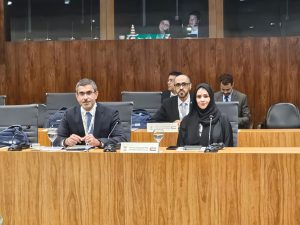BRASÍLIA / WAM
Eng Sharif Al Olama, Undersecretary for Energy and Petroleum Affairs at the Ministry of Energy and Infrastructure, represented the UAE at the BRICS Energy Ministerial Meeting, hosted under the Brazilian Chairmanship in the capital city Brasília. Addressing representatives of BRICS members and partners, Al Olama said, “We are living through a defining moment in the global energy transition. The world is confronting a dual challenge: to ensure secure and affordable energy access for all, while dramatically reducing emissions to meet climate goals. For the UAE, this is not a dilemma, but an opportunity to drive transformation through innovation, collaboration, and decisive action.”
He added, “The UAE has made energy access a national achievement. Today, we are proud to have 100 percent access to electricity, clean cooking solutions, and affordable heating and cooling services. We rank first globally in key energy access and affordability indicators. “However, we recognise that our work is not complete until this becomes the reality for everyone. That’s why we are investing in renewable energy projects in over 70 countries, especially in Africa, the Caribbean, and small island developing states. We are committed to sharing our models on energy financing, public-private partnerships, and technology deployment to support energy justice globally.”
In addition, Al Olama invited BRICS nations and partners to join the Global Energy Efficiency Alliance, which the UAE founded to reduce carbon intensity by advancing efficiency standards, fostering knowledge exchange, and supporting joint capacity-building. Through this alliance, BRICS members can play a vital role in accelerating global energy savings and advancing the collective decarbonisation journey. He pointed out that the UAE is interconnected with other GCC states through the Gulf Cooperation Council Interconnection Authority (GCCIA), enhancing regional grid stability and energy security.
The UAE actively pursues both bilateral and multilateral partnerships to deepen regional and global energy integration. A prominent example is the UAE’s collaboration with India, which includes efforts to establish a direct power interconnection and joint participation in the India-Middle East-Europe Economic Corridor (IMEC). This strategic corridor aims to bolster economic cooperation, accelerate clean energy deployment, and improve connectivity between Asia, the Middle East, and Europe. Through these initiatives, the UAE is reinforcing its commitment to cross-border energy trade, decarbonisation, and global energy security.
At the meeting, the Brazilian Presidency presented BRICS Energy Research Cooperation Platform (ERCP) Report, which focuses on ensuring access to affordable, reliable, and modern energy, especially for underserved communities, and the Roadmap for BRICS Energy Cooperation for 2025-2030, which provides a strategic vision for advancing cooperation in clean energy, sustainable fuels, grid interconnection, and innovation.
 The Gulf Time Newspaper One of the finest business newspapers in the UAE brought to you by our professional writers and editors.
The Gulf Time Newspaper One of the finest business newspapers in the UAE brought to you by our professional writers and editors.
